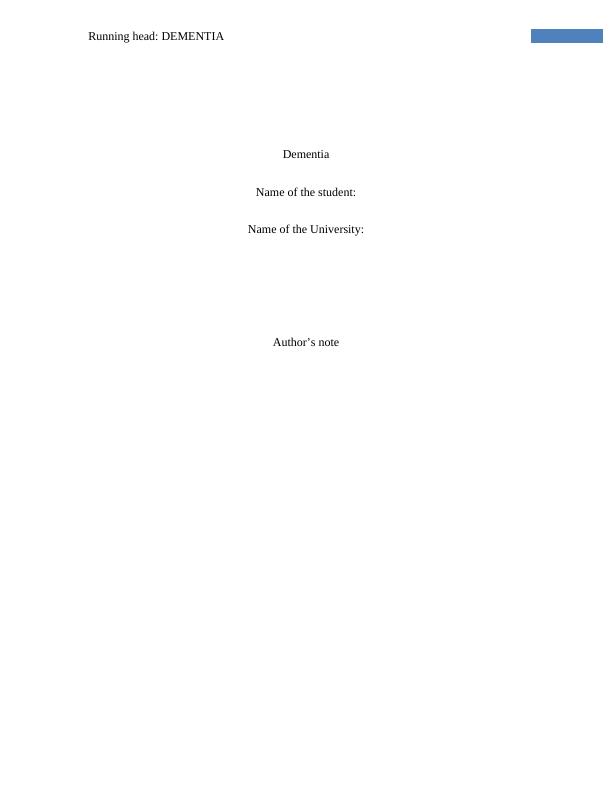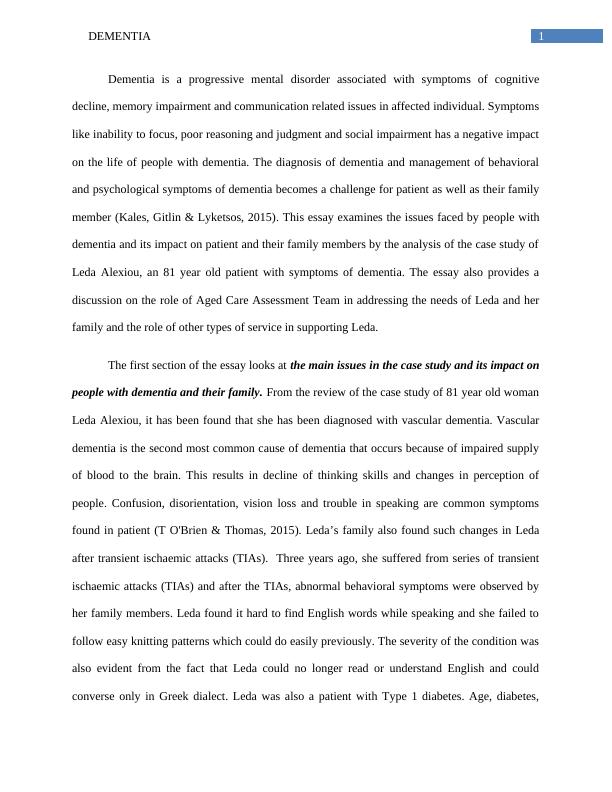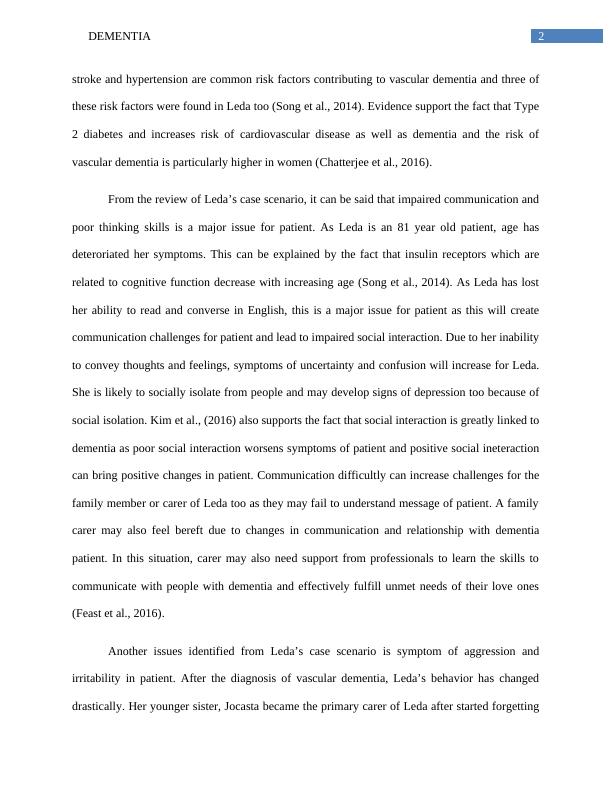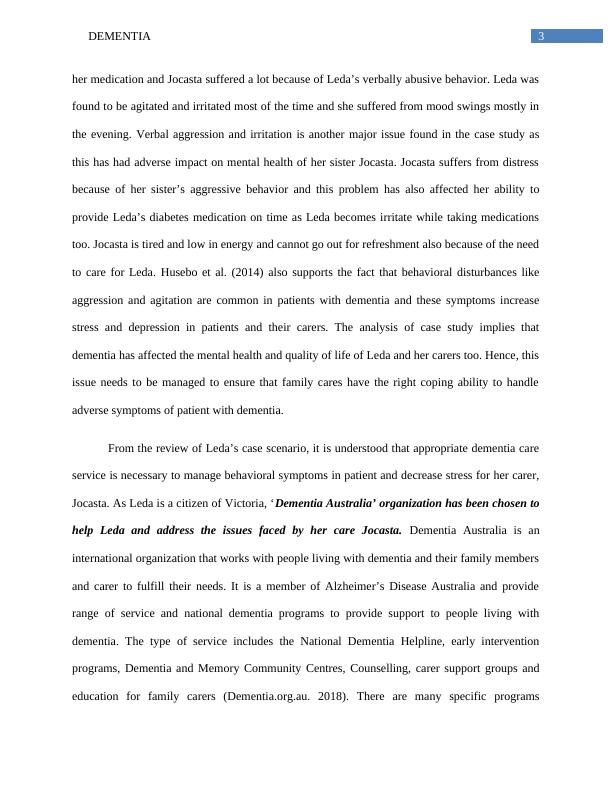Issues Faced by People with Dementia and Role of Dementia Australia in Addressing Them: A Case Study Analysis
Added on 2023-06-14
11 Pages3135 Words226 Views
Running head: DEMENTIA
Dementia
Name of the student:
Name of the University:
Author’s note
Dementia
Name of the student:
Name of the University:
Author’s note

1DEMENTIA
Dementia is a progressive mental disorder associated with symptoms of cognitive
decline, memory impairment and communication related issues in affected individual. Symptoms
like inability to focus, poor reasoning and judgment and social impairment has a negative impact
on the life of people with dementia. The diagnosis of dementia and management of behavioral
and psychological symptoms of dementia becomes a challenge for patient as well as their family
member (Kales, Gitlin & Lyketsos, 2015). This essay examines the issues faced by people with
dementia and its impact on patient and their family members by the analysis of the case study of
Leda Alexiou, an 81 year old patient with symptoms of dementia. The essay also provides a
discussion on the role of Aged Care Assessment Team in addressing the needs of Leda and her
family and the role of other types of service in supporting Leda.
The first section of the essay looks at the main issues in the case study and its impact on
people with dementia and their family. From the review of the case study of 81 year old woman
Leda Alexiou, it has been found that she has been diagnosed with vascular dementia. Vascular
dementia is the second most common cause of dementia that occurs because of impaired supply
of blood to the brain. This results in decline of thinking skills and changes in perception of
people. Confusion, disorientation, vision loss and trouble in speaking are common symptoms
found in patient (T O'Brien & Thomas, 2015). Leda’s family also found such changes in Leda
after transient ischaemic attacks (TIAs). Three years ago, she suffered from series of transient
ischaemic attacks (TIAs) and after the TIAs, abnormal behavioral symptoms were observed by
her family members. Leda found it hard to find English words while speaking and she failed to
follow easy knitting patterns which could do easily previously. The severity of the condition was
also evident from the fact that Leda could no longer read or understand English and could
converse only in Greek dialect. Leda was also a patient with Type 1 diabetes. Age, diabetes,
Dementia is a progressive mental disorder associated with symptoms of cognitive
decline, memory impairment and communication related issues in affected individual. Symptoms
like inability to focus, poor reasoning and judgment and social impairment has a negative impact
on the life of people with dementia. The diagnosis of dementia and management of behavioral
and psychological symptoms of dementia becomes a challenge for patient as well as their family
member (Kales, Gitlin & Lyketsos, 2015). This essay examines the issues faced by people with
dementia and its impact on patient and their family members by the analysis of the case study of
Leda Alexiou, an 81 year old patient with symptoms of dementia. The essay also provides a
discussion on the role of Aged Care Assessment Team in addressing the needs of Leda and her
family and the role of other types of service in supporting Leda.
The first section of the essay looks at the main issues in the case study and its impact on
people with dementia and their family. From the review of the case study of 81 year old woman
Leda Alexiou, it has been found that she has been diagnosed with vascular dementia. Vascular
dementia is the second most common cause of dementia that occurs because of impaired supply
of blood to the brain. This results in decline of thinking skills and changes in perception of
people. Confusion, disorientation, vision loss and trouble in speaking are common symptoms
found in patient (T O'Brien & Thomas, 2015). Leda’s family also found such changes in Leda
after transient ischaemic attacks (TIAs). Three years ago, she suffered from series of transient
ischaemic attacks (TIAs) and after the TIAs, abnormal behavioral symptoms were observed by
her family members. Leda found it hard to find English words while speaking and she failed to
follow easy knitting patterns which could do easily previously. The severity of the condition was
also evident from the fact that Leda could no longer read or understand English and could
converse only in Greek dialect. Leda was also a patient with Type 1 diabetes. Age, diabetes,

2DEMENTIA
stroke and hypertension are common risk factors contributing to vascular dementia and three of
these risk factors were found in Leda too (Song et al., 2014). Evidence support the fact that Type
2 diabetes and increases risk of cardiovascular disease as well as dementia and the risk of
vascular dementia is particularly higher in women (Chatterjee et al., 2016).
From the review of Leda’s case scenario, it can be said that impaired communication and
poor thinking skills is a major issue for patient. As Leda is an 81 year old patient, age has
deteroriated her symptoms. This can be explained by the fact that insulin receptors which are
related to cognitive function decrease with increasing age (Song et al., 2014). As Leda has lost
her ability to read and converse in English, this is a major issue for patient as this will create
communication challenges for patient and lead to impaired social interaction. Due to her inability
to convey thoughts and feelings, symptoms of uncertainty and confusion will increase for Leda.
She is likely to socially isolate from people and may develop signs of depression too because of
social isolation. Kim et al., (2016) also supports the fact that social interaction is greatly linked to
dementia as poor social interaction worsens symptoms of patient and positive social ineteraction
can bring positive changes in patient. Communication difficultly can increase challenges for the
family member or carer of Leda too as they may fail to understand message of patient. A family
carer may also feel bereft due to changes in communication and relationship with dementia
patient. In this situation, carer may also need support from professionals to learn the skills to
communicate with people with dementia and effectively fulfill unmet needs of their love ones
(Feast et al., 2016).
Another issues identified from Leda’s case scenario is symptom of aggression and
irritability in patient. After the diagnosis of vascular dementia, Leda’s behavior has changed
drastically. Her younger sister, Jocasta became the primary carer of Leda after started forgetting
stroke and hypertension are common risk factors contributing to vascular dementia and three of
these risk factors were found in Leda too (Song et al., 2014). Evidence support the fact that Type
2 diabetes and increases risk of cardiovascular disease as well as dementia and the risk of
vascular dementia is particularly higher in women (Chatterjee et al., 2016).
From the review of Leda’s case scenario, it can be said that impaired communication and
poor thinking skills is a major issue for patient. As Leda is an 81 year old patient, age has
deteroriated her symptoms. This can be explained by the fact that insulin receptors which are
related to cognitive function decrease with increasing age (Song et al., 2014). As Leda has lost
her ability to read and converse in English, this is a major issue for patient as this will create
communication challenges for patient and lead to impaired social interaction. Due to her inability
to convey thoughts and feelings, symptoms of uncertainty and confusion will increase for Leda.
She is likely to socially isolate from people and may develop signs of depression too because of
social isolation. Kim et al., (2016) also supports the fact that social interaction is greatly linked to
dementia as poor social interaction worsens symptoms of patient and positive social ineteraction
can bring positive changes in patient. Communication difficultly can increase challenges for the
family member or carer of Leda too as they may fail to understand message of patient. A family
carer may also feel bereft due to changes in communication and relationship with dementia
patient. In this situation, carer may also need support from professionals to learn the skills to
communicate with people with dementia and effectively fulfill unmet needs of their love ones
(Feast et al., 2016).
Another issues identified from Leda’s case scenario is symptom of aggression and
irritability in patient. After the diagnosis of vascular dementia, Leda’s behavior has changed
drastically. Her younger sister, Jocasta became the primary carer of Leda after started forgetting

3DEMENTIA
her medication and Jocasta suffered a lot because of Leda’s verbally abusive behavior. Leda was
found to be agitated and irritated most of the time and she suffered from mood swings mostly in
the evening. Verbal aggression and irritation is another major issue found in the case study as
this has had adverse impact on mental health of her sister Jocasta. Jocasta suffers from distress
because of her sister’s aggressive behavior and this problem has also affected her ability to
provide Leda’s diabetes medication on time as Leda becomes irritate while taking medications
too. Jocasta is tired and low in energy and cannot go out for refreshment also because of the need
to care for Leda. Husebo et al. (2014) also supports the fact that behavioral disturbances like
aggression and agitation are common in patients with dementia and these symptoms increase
stress and depression in patients and their carers. The analysis of case study implies that
dementia has affected the mental health and quality of life of Leda and her carers too. Hence, this
issue needs to be managed to ensure that family cares have the right coping ability to handle
adverse symptoms of patient with dementia.
From the review of Leda’s case scenario, it is understood that appropriate dementia care
service is necessary to manage behavioral symptoms in patient and decrease stress for her carer,
Jocasta. As Leda is a citizen of Victoria, ‘Dementia Australia’ organization has been chosen to
help Leda and address the issues faced by her care Jocasta. Dementia Australia is an
international organization that works with people living with dementia and their family members
and carer to fulfill their needs. It is a member of Alzheimer’s Disease Australia and provide
range of service and national dementia programs to provide support to people living with
dementia. The type of service includes the National Dementia Helpline, early intervention
programs, Dementia and Memory Community Centres, Counselling, carer support groups and
education for family carers (Dementia.org.au. 2018). There are many specific programs
her medication and Jocasta suffered a lot because of Leda’s verbally abusive behavior. Leda was
found to be agitated and irritated most of the time and she suffered from mood swings mostly in
the evening. Verbal aggression and irritation is another major issue found in the case study as
this has had adverse impact on mental health of her sister Jocasta. Jocasta suffers from distress
because of her sister’s aggressive behavior and this problem has also affected her ability to
provide Leda’s diabetes medication on time as Leda becomes irritate while taking medications
too. Jocasta is tired and low in energy and cannot go out for refreshment also because of the need
to care for Leda. Husebo et al. (2014) also supports the fact that behavioral disturbances like
aggression and agitation are common in patients with dementia and these symptoms increase
stress and depression in patients and their carers. The analysis of case study implies that
dementia has affected the mental health and quality of life of Leda and her carers too. Hence, this
issue needs to be managed to ensure that family cares have the right coping ability to handle
adverse symptoms of patient with dementia.
From the review of Leda’s case scenario, it is understood that appropriate dementia care
service is necessary to manage behavioral symptoms in patient and decrease stress for her carer,
Jocasta. As Leda is a citizen of Victoria, ‘Dementia Australia’ organization has been chosen to
help Leda and address the issues faced by her care Jocasta. Dementia Australia is an
international organization that works with people living with dementia and their family members
and carer to fulfill their needs. It is a member of Alzheimer’s Disease Australia and provide
range of service and national dementia programs to provide support to people living with
dementia. The type of service includes the National Dementia Helpline, early intervention
programs, Dementia and Memory Community Centres, Counselling, carer support groups and
education for family carers (Dementia.org.au. 2018). There are many specific programs

End of preview
Want to access all the pages? Upload your documents or become a member.
Related Documents
Nursing Assignment Vascular Dementialg...
|8
|2122
|148
CAA500 | Clinical Reasoning - Case studylg...
|12
|2789
|75
Case study of Martinlg...
|16
|5017
|320
